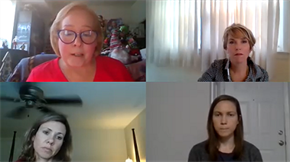Subscribe for Weekly Updates

PICPA Roundtable: Employee Engagement Strategies for New Hires During COVID-19
 By Allie N. Peplau
By Allie N. Peplau
The COVID-19 pandemic has challenged accounting firm administrators to think of new ways to keep staff engaged and connected as they work from home. In particular, interns and new hires have been experiencing 100% remote work for the entirety of their time with their new firms.
In December 2020, a group of administrators and human resources leaders from accounting firms across Pennsylvania met to share best practices on keeping interns and new hires focused on their tasks despite the challenges presented by a virtual workspace. The discussion was led by Felicia Robbins, manager of the Pennsylvania CPA Foundation, and Sara Albert-Hussey, PICPA’s member relations manager.
 |
|
More than 20 accounting firm HR and personnel managers virtually met for a PICPA roundtable to share best practices and discuss the challenges presented by a virtual workspace. |
Joanne Zeitz of EisnerAmper LLP started off the conversation with a summary of some of the practices that have worked well for her firm during onboarding of new hires throughout the year. She mentioned that every Monday morning a dedicated team would meet with new staff members. A week-long orientation period would follow, then a week of technical training. For virtual calls that took place during the training period, breakout sessions helped. Seniors joined these sessions, which allowed new hires to get to know established colleagues in a more low-key setting.
Keeping up ongoing communication between new hires and their colleagues has proven difficult, but Bridget Flanagan of BBD LLP found that assigning mentors to each new intern provided an opportunity for interns to engage in conversations about the challenges of the year. Chelsea Goldschrafe of RSM US LLP pointed to a similar success at her firm. Setting up meetings between new hires and colleagues with whom they may not interact every day has been helpful in fostering relationships that may continue long term.
As far as shortcomings go, virtual “water cooler” conversations and happy hours with no structure proved ineffective. Flanagan reported that having more structured agendas seemed to work better. For example, ice breaker questions planned ahead of time, like “Share a silver lining of the past month,” helped get conversations going.
Shedding light on another important factor that has been limited by work-from-home directives, Janel Bonsell of Schaffner Knight Minnaugh & Company PC asked if anyone could recommend ways to ensure that new hires don’t miss out on building networking skills in their first year.
Natalie Campbell of Arnett Carbis Toothman LLP shared that her firm created a competition involving a list of networking activities—sharing LinkedIn articles, sending e-blasts, etc.—for points. After scoring a certain number of points, staff would be entered into a cash pool to be divided amongst them at the end of the year. Similarly, Doris Kerr of Barbacane Thornton & Company LLP and her team designed a bingo game with a different activity in each square. For completing tasks like writing five handwritten notes to professional contacts or endorsing 10 people on LinkedIn, participants would mark the corresponding square. Making a game of these activities boosted enthusiasm.
Next, the participants covered how technology has been used to enhance the work-from-home experience. Flanagan explained that BBD has shared photos and bios for each new hire on Microsoft’s instant messaging platform, Teams. Her firm has also used Teams to host no-obligation, fun challenges—workspace decorating contests, for example—as well as casual “water cooler” conversations, prompted by questions such as, “What TV shows are you enjoying right now?”
Albert-Hussey recommended an employee rewards program called Bonusly, which allows employees to award points to their coworkers to show appreciation for one another. Points can then be redeemed for digital gift cards from a variety of popular stores. In her experience, Bonusly has proven successful in recognizing staff for going above and beyond.
The conversation concluded with a look toward the future. Bonsell mentioned that when the idea was proposed that all employees would return to her office over the summer, there was a lot of unexpected pushback. This was a good reminder that keeping lines of communication open is crucial, and management should ensure that they are on the same page as staff. This prompted a hypothetical question from Robbins: there is talk of many offices never returning to a fully in-person working environment. How would this affect retention for those firms that maintain in-person working expectations following the pandemic?
All participants seemed to agree that this was something that employers should keep in mind as they observe the lasting effects of the pandemic. Zeitz recommended that the group reconvene sometime in the next few months to discuss plans for a return to offices as the COVID-19 vaccine rolls out. In the meantime, the PICPA has compiled a list of resources on reopening offices responsibly that can be found on the CPA Practice Management webpage.
Allie N. Peplau is member engagement administrator for the PICPA. She can be reached at apeplau@picpa.org.







Leave a commentOrder by
Newest on top Oldest on top